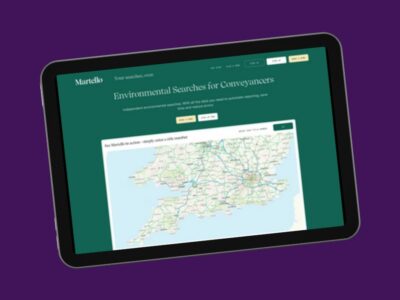SABs in Wales: Working with SuDS Approval Bodies
Since 7th January 2019, all new Welsh developments of more than 1 dwelling house or where the construction area is 100m2 or more require Sustainable Drainage Systems (SuDS) for surface water. Developers must gain approval of their drainage scheme from a SuDS Approval Body (SABs) before construction can begin.
We’ve previously written about how Welsh SuDS are now mandatory for new developments and outlined the changes to the process – in this post, we explain the role of SABs and how you can work with them effectively in support of your client’s development application.
The Welsh Government were the first to recognise the important contribution that SuDS make to ensuring the impact of extreme surface flooding in our communities and infrastructure is better managed, through flooding risk assessments and drainage systems.
All new Welsh developments are now required to include Sustainable Drainage Systems (SuDS) which comply with National Statutory SuDS Standards. Part of this process includes sign off by relevant SABs to the Local Authority in which a planning submission for development is made.
What are ‘SABs’?
SABs are a statutory function delivered by the Local Authority and are required to:
- Evaluate and approve drainage applications for new developments where construction work has drainage implications
- Adopt and maintain sustainable surface water drainage systems according to Section 17 of Schedule 3 (FWMA)
SABs also have powers of inspection and enforcement and use discretionary powers to offer non-statutory pre-application advice.
What does it mean for my development?
Whether you are a developer, an agent or an individual seeking planning permission for a development, if your development is of more than one house or of 100m2 or more of construction area, you must also seek SAB approval alongside planning approval.
You will not be allowed to start construction until both planning permission and that of the SAB is granted.
If you have an existing site or development with planning permission granted, or deemed to be granted (whether or not subject to any conditions as to a reserved matter), or for which a valid application has been received but not determined by 7th January 2019, you will not be required to apply for SABs approval.
However, SABs approval will still be required if the planning permission was granted subject to a condition as to a reserved matter and an application for approval of the reserved matter is not made before 7th January 2020.
At a recent meeting of Susdrain attended by Geosmart, Michelle Johnson and Rhodri Powell of Caerphilly County Borough Council provided some very useful insight into the roll-out of the new SABs. Caerphilly are leading the way and providing support to several other local authorities. SuDS schemes must meet the National Welsh Standards which include requirements for hydraulic design, flood risk, water quality, biodiversity, amenity, construction and maintenance. No development can take place before SAB approval is received, which means a significant amount of detailed design and infiltration testing must be done in advance of planning permission rather than as a later condition.
Efforts are underway to standardise the approach and application forms across the 22 local authorities which form the SABs, but this is a work in progress and there are still local variations. Additional work may be required to develop guidance for small developers. Pre-Application and Full Application forms must be completed requiring extensive information (up to 37 pages) on site ownership and the design. The SAB can make charges for the application fee plus site inspection, and finances are required to support non-performance bonds and commuted sums to cover the maintenance and replacement costs of the scheme by the SAB over a 60- or 120-year lifespan.
Ultimately the SAB will adopt the scheme in most circumstances, but in some instances the SAB approves but does not adopt SuDS, if the scheme is a publicly maintained road or serves a single property. It is noted that this exemption from adoption can apply on the basis of a ‘single curtilage’ where separate commercial properties sited on land privately-owned by a single body (e.g., a shopping centre, airport terminal, retail park, etc.) can be considered as a single curtilage if the commercial properties share the site access and facilities.
How do I seek SAB approval?
The SABs chargeable pre-application advice service is different from the planning pre-application service, so early engagement between relevant services will need to take place. This will ensure suitability of proposed SuDS design in line with national standards. This service will be valuable to developers to help limit potential delays and reduce costs in the long term.
Full-applications must be submitted to SABs for validation and must be accompanied by:
- a plan specifying the construction area and the extent of the drainage system
- information on how the construction work will comply with the SuDS Standards
- information requested in the application form checklist
- the appropriate application fee
The SAB will have 7 weeks to determine applications other than those requiring an Environmental Impact Assessment, in which case it has 12 weeks. Application forms and adjoining documentation will be available from your local SAB and all submissions will need to be made to the relevant SAB.
Is anything changing in England?
England is not proceeding with the set-up of SABs. However, recent initiatives by WaterUK has led to the development of Sewers for Adoption 8 (SFA8) which includes provision for adoption by water companies in England of certain elements of Suds schemes. This is still going through the OFWAT review process and the current estimate is that it will come into force in April 2020, replacing the previous versions SfA6 & 7.
Ensuring the Right Drainage Strategy
Here at GeoSmart, we are getting many enquiries from Welsh developers and their retained architect or planning adviser on how to deliver an appropriate drainage strategy that will satisfy the requirements of the relevant SAB.
It is important to stress that strategies must meet the core principles as enshrined in Section 3 of the Flood and Water Management Act 2010. These are:
- flood risk reduction,
- improved water quality,
- opportunities for habitat creation,
- enhanced biodiversity,
- Supporting well-being through bringing people closer to green and blue community spaces.
But they must also meet the site characteristics for the SuDS to work effectively and therefore be compliant. This is where GeoSmart comes in.
Our SuDSmart Pro report provides information which can be used to complete parts of the SAB pre-application form. To ensure a valid application, as much initial supporting information as possible should be provided. This may include:
- Details of any ground investigation, confirmation of soil conditions including borehole or trial pit logs;
- Groundwater monitoring data (over a period of up to 12 months) and detailed infiltration testing data (including soil infiltration coefficients and Standard Percentage Run-off calculations;
- Detailed design of the proposals including construction specification; and
- A detailed maintenance and adoption plan.
We can engage in early discussions with the SAB, in advance of the pre-application submission, to confirm their broad agreement of the drainage strategy and requirement for these further details specifically. We will then advise of the additional requirements and associated costs. Once your application form together with any supporting material has been correctly submitted to the SAB, it will be validated. If deemed to be a Valid Application, your submission will be technically assessed, and a SAB officer will contact you to commence Pre-Application discussions.
There is no statutory timescale relating to the Pre-Application process. All technical and non-technical discussions with SAB should be undertaken as part of the Pre-Application stage, as only in exceptional circumstances, will SAB contact you during its assessment of the Full SuDS Scheme Application.
Following the feedback received from the SAB, we will complete the second form and prepare the necessary supplementary information based on any comments / additional works undertaken. Any significant changes in scope or additional information required as a result of their may be subject to an additional charge at our standard hourly rate.
Following submission, SAB will notify you of the outcome of its technical assessment of your Full Application; and the Full Application may be approved subject to conditions.
Contact us today on 01743 298 100 or email us at enquiries@geosmartinfo.co.uk to gain an insight into the Welsh requirements for SuDS and if you have any projects you require assistance with.



